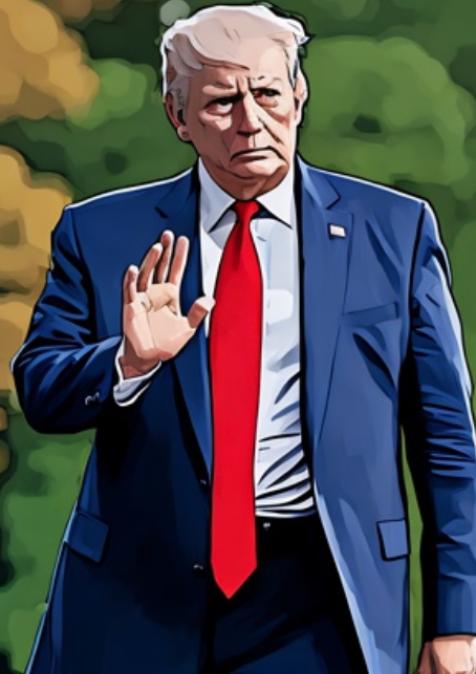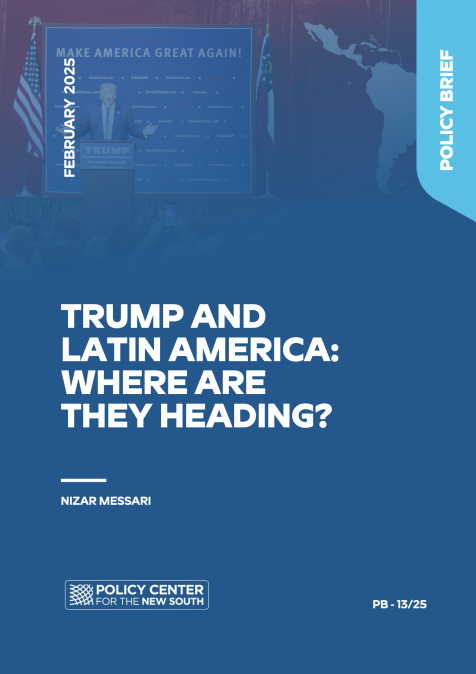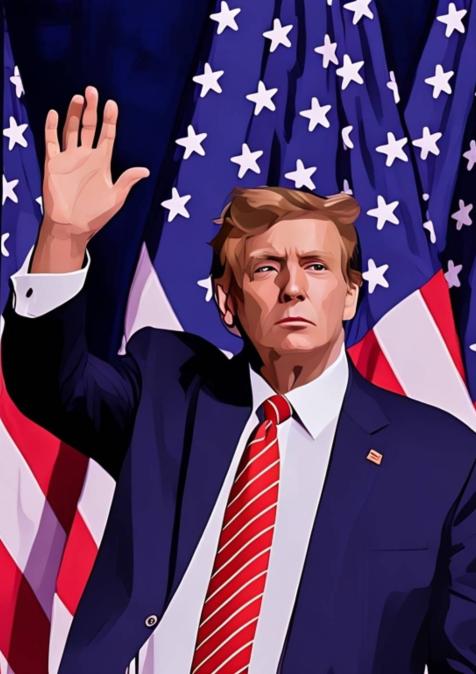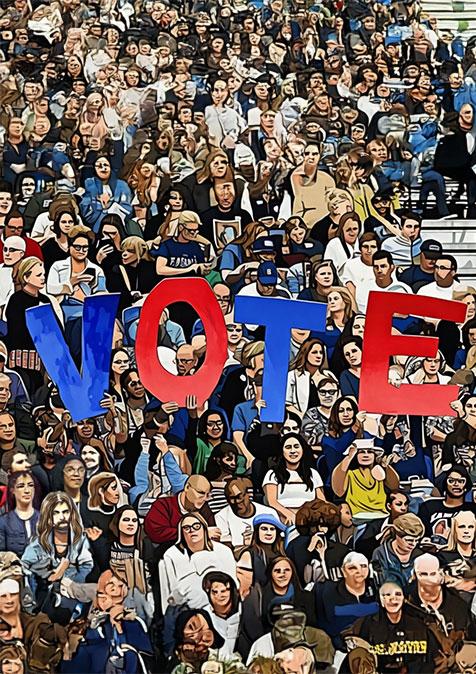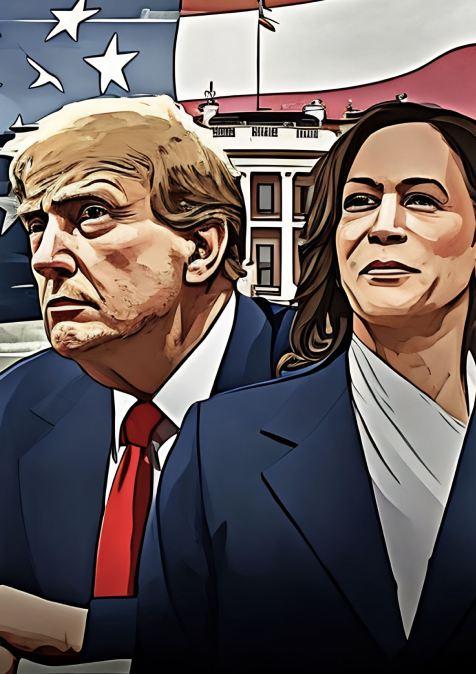Publications /
Opinion
The Trump Administration “America First” policy changed U.S. foreign policy towards the African continent. Trump opposed trade agreements with several countries, considering them to be unfavorable to the U.S., given the nature of the African market. He shifted the U.S. concern in Africa from fighting against violent extremism and terrorism to a direct competition with other great powers—China and Russia—which had already extensively implemented African strategies. He endeavored to reduce the U.S. military footprint in Africa, and to reduce American financing of the international organizations on which Africa largely depends. Even he wanted to reduce U.S. direct foreign aid assistance, though the U.S. Congress did not accept that decision. Trump’s Administration was less interested in creating a tactical strategy to deal with Africa’s political challenges and issues, but focused rather on African nations as a factor in China-U.S. competition.
According to General Stephen J. Townsend[1], U.S. Army commander of the U.S-Africa Command, the United States considers Africa as a major crossroads of international commerce and trade, surrounded by the world’s most important sea lines of communication, namely the Mediterranean Sea, the Strait of Gibraltar on NATO’s southern flank, the Red Sea and the Bab al Mandeb strait, in addition to the Mozambique Channel. These corridors sea lines communication routes facilitate one-third of the world’s shipping, and are key to the transportation of Africa’s vast natural resources, including energy and strategic minerals. Africans, Americans, and global prosperity depend on unhindered access to these waters.
The U.S. plays a huge role in ensuring the accessibility of these strategic routes to all, but malign competitors – China, Russia- along with violent extremist organizations (VEOs) remain a real threat to U.S. interests[2]. For istance, The U.S. has strategic access and global control of the space of sub-Saharan African countries, whether by land, air or sea. The Sahel provides strategic access to and control of the Gulf of Guinea region, where seven of the world's eight billion barrels of reserves are located. The Horn of Africa, located at the southern end of the Red Sea, is close to major oil supply lines and is the perfect location for a military force projection towards the Middle East and the Persian Gulf[3]. AFRICOM's Surface Distribution Network connects ports in East and Horn of Africa, namely Manda Bay, Garissa and Mombassa in Kenya, Entebbe in Uganda, Dire Dawa in Ethiopia and Djibouti, to ports in West Africa, including the ports of Tema in Ghana and Dakar in Senegal.[4] Thus the militarization of Africa is useful to protect American economic interests against China, but also an economic opportunity for companies in the field of armament and military equipment. This said, the activity of VEO's in these strategic regions represents a threat to U.S. interests (and U.S. citizens based in the areas of interest) and can disrupt the extraction and delivery of natural resources from these regions. Most VEOs in Africa seek to strike the U.S. within the region. In East Africa, the U.S. is focusing on al-Qa’ida and al-Shabaab. The latest manifestation of this threat was the January 5, 2020, attack by Al-Shabaab on U.S. forces at the Kenyan Naval Base in Manda Bay, which killed three Americans, attacking the U.S. outside of Somalia. There was also an attack in North Africa in February 2020, targeting the U.S. Embassy in Tunisia. Moreover, in the Sahel, the primary VEO threats are al-Qa’ida’s Jama’at Nusrat al-Islam wal-Muslimin (JNIM) and ISIS affiliates and networks that connect the Sahel with the Lake Chad Basin, which threaten directly U.S. citizens and U.S. commercial and security interests. Given that Africa's stability can strongly impact in both ways commercial and security terms of Europe, the Greater Middle East, and the coastal security of the Mediterranean Sea, where the U.S. needs to safeguards its interests and security-related matters, how might President-elect Joe Biden’s African strategy develop?
Biden’s Priorities Besides the African Continent:
Even though Trump has shown little interest in Africa, the U.S. should be able to regain quickly its influence on the continent. The U.S. has a dense diplomatic network with around 50 embassies on the continent, and a military presence with approximatively 7,000 soldiers deployed to 34 sites. With that, the U.S. potential of attractiveness still remains, and Africa could regain its importance under Biden’s Administration, though without becoming a priority strategic theater as the U.S. has more important matters to deal with.
Among the main important matters that Biden needs to deal with outside of the African continent, and which will be the subject of his main policy changes, would certainly be a return to multilateralism, including a re-commitment to international organizations, specifically the WHO. In addition, U.S. climate policy will change. The United States will have to officially notify the United Nations of its willingness to rejoin the historic Paris Agreement. The postponment of the international climate conference COP26 which will take place in the United Kingdom, will allow the U.S to participate in this important conference. Another major change in Biden's policy would be the Joint Comprehensive Plan of Action (JCPoA) deal, or nuclear deal with Iran. The U.S. withdrawal from the JCPoA in 2018 has heavily penalized the Iranian mullahs, and Trump's isolationist policy towards Iran threatens the ruling theocracy in Tehran[5]. One of Joe Biden's campaign pledges[6] was a promise to rejoin the JCPoA agreement if the Iranians comply with it in turn. Moreover, the normalization of relations between Arab countries and Israel ( including that of Sudan) initiated by Trump fits into this strategy of isolation of Iran. In fact, the recent proximity between Saudi Arabia and Israel is currently worrying Iran. On this question of normalization, Joe Biden could benefit in all possible scenarios, insofar as it allows him not to reverse course with the Iranians, but rather to possibly resume negotiations with Tehran. And finally, the great change expected by Europeans especially will be the strengthening and respecting of the international order by reinvigorating NATO, and perhaps retreating from the decisions taken by Trump on the withdrawal of American soldiers and the reduction of the budget allocated to NATO.
The Time-Sensitive Issues Joe Biden Needs to Deal with in Africa:
The situation in Ethiopia: The regular ethnic violence in Ethiopia and the elections scheduled for next year will remain urgent issues to follow. It is unclear whether the outbreak of clashes on November 4 between the state and the northern region of Tigray (which is at odds with the current power) will last until the official entry into office of President-elect Biden on January 20. The conflict threatens the stability of the region.
The democratic transition in Sudan: A few weeks before the presidential elections, Trump announced the removal of sanctions against Khartoum. He initiated the process to remove the country from the list of states sponsoring terrorism, in exchange for a recognition of Israel. This procedure is currently in the hands of Congress, which is due to vote on it in early December. The measure is expected to pass smoothly since the new American elected officials will not take office until January. Given the advanced stage of normalization negotiations with Israel, it is unlikely that Biden will halt them—as it fits within the isolationist strategy of Trump, from which Biden can benefit. The second remaning question is whether Biden will continue to support the democratic and economic transition in Sudan, and how and with what conditions. In addition, the new transitional government continues to face several challenges that may set back its nascent democratic reforms and strengthen the military and supporters of the old regime. The question of war crimes in Darfur and the relationship between Sudan and the International Criminal Court will be determining factors.
The terrorist threat in Somalia: On taking office in 2017, Trump signed a directive designating several Somali regions as sectors of “active hostility”, initiating a strategy of aerial militarization against Al-Shabaab. This softened the procedures for triggering attacks, which increased from 14 to 63 attacks in four years and led to a series of controversies over civilian casualties. Al-Shabaab have now adapted themselves to this directive by carrying out more attacks (i.e. attacks against the Baledogle base where Americans provide training sessions to the Somali Special Forces), enabling them to control up to 20% of the territory. Biden will have to take over the Somali case at a sensitive time, and will have to reconsider the continuity of this strategy, as well as Trump's desire to withdraw the 700 American soldiers from Somalia. The American presence in the region should be reinforced as Al-Shabaab threat remains significant in the region, which means that the country will still need American support.
The Libyan Crisis: The latest update of the U.S. military posture in Libya was the announcement by the Pentagon's Inspector General that some resources will be moved from Somalia to Libya, where Russia and Turkey are intervening. The reason behind this is Russian activity along NATO’s southern flank in North Africa. For that, the U.S. wanted to expand the competitive space and outpace Chinese and Russian influence in Africa. China’s expanding telecommunications presence in the region could increase the risk of Chinese surveillance against Western and host nation personnel and interests. The positioning of Biden’s administration within the Libya crisis is to consider, as we might see a return back to the pure democrats’ tradition in that region which is to promote democracy within African nations while promoting local development through U.S foreign aid and programs. For the Biden administration, it could be a lucky opportunity to support the UN and demonstrate how the US can provide more attention and support for multilateralism. Indeed, a more stable Libya would make it easier for the future administration to engage the countries of the Eastern Mediterranean over the larger issues of gas exploitation. A reopening of the US embassy in Tripoli will be propitious for all.
The Positioning in the Sahel: The U.S. military presence in the Sahel remains a major issue for which Joe Biden's team has provided no indication of its intentions. Under Trump, the former Defense Secretary Mark Esper initiated a blank-slate review of U.S. military operations and posture worldwide, including an update for the U.S. Sahel strategy. This update consisted of keeping extremist groups in the Sahel from expanding their memberships and spreading into new areas in the south of the Sahara Desert by trying to degrade them and/or reduce their influence, while competing against China and Russi’s support to VEO’s operations and limiting their harmful influence . Leaving the ground for Russia and China to fill the void will be to the detriment of the U.S. as VEOs will grow unchecked. Some will ultimately threaten U.S. trade and investment relations with some of the fastest-growing economies in the world, such as Nigeria. On the other hand, the appointment of Peter Pham on March 8, 2020 by U.S. Secretary of State Mike Pompeo as the first-ever envoy to the African Sahel region to support U.S. diplomatic efforts for security and stability, should comfort African countries and forces on the ground in the Sahel. However, France fears the absence of U.S. support, and remains concerned about the readjustment of the U.S. military forces in Africa, estimated at $50 million per year to the 4,500 French soldiers engaged in the field[7]. The American doctrine has rarely positioned itself in Mali in the Sahel as the French or the UN do, but the U.S. position in the region has always been to train local armies, to conduct ad-hoc military operations on the ground, and to provide the international forces present in Mali and in the Sahel with important intelligence and surveillance capacities, notably through drones. Will this change under Joe Biden? Will he decide to develop more transversal cooperation with the G5 Sahel countries? The question will also be whether the President-elect will decrease or increase the $50 million dollars per year spent by the U.S. for security in the region.
The likely African concerns of a Biden administration?
Under the Trump Administration, Africa was a blind spot. While Trump threatened to scale back the $50 million[8] in counterterrorism funding to Africa, and to withdraw the drones parked in Niger, one can hope that Biden would not do so and would improve relations. Indeed, the Biden plan includes positive signs for a closer relationship with the African continent, but Africans should not expect a return to Barack Obama's huge efforts to aspire for a developed Africa, because the arrival in power of a democrat close to Obama does not necessarily mean a great and deep change in Africa-America relations.
Biden’s Administration presents an opportunity for a meaningful restart of a more realistic and transparent policy towards Africa, in which regional allies will once again be valued as important partners. The published ‘Biden-Harris Diaspora Agenda’[9] campaign already provides an overview of the likely African concerns of a Biden administration. What can Africans expect?
- A renewal of diplomatic ties with African institutions, including the African Union and African governments, especially considering that Biden has promised to maintain Yali, the young African leaders' program. The future U.S. administration may play a great role in helping the AU rethink its own governance challenges, especially enabling an effective and inclusive African governance system.
- Although he has made no reference to increased U.S. federal spending on African aid and development, Biden has promised to convene a summit of African heads of state, as Barack Obama did in 2014, which could greatly improve the tone of Washington's relations with Africa, being mindful that Biden benefits in advance from the expertise of diplomats Nicolas Burns and Susan Rice, the former African affairs chief under Bill Clinton.
- A radical shift on migration issues can occur. Joe Biden intends to end Donald Trump's inhumane immigration policy. He plans to cancel the travel bans and restrictions that affect citizens of many countries, including Nigerian, Sudanese, and Somali citizens. Biden advocates for a renewed commitment to family unification and diversity, promising the re-establishment of the United States as a place of refuge and advocating a pathway to citizenship for illegal immigrants. This proposal cannot be blocked by a hostile Republican majority in the Senate, if such a majority should emerge, as it might be implemented by executive order.
- The Biden Administration would also be more likely to support the extension of the African Growth and Opportunity Act (AGOA) beyond 2025. Trade tensions with China can be expected to reduce under the Biden Administration, which could be beneficial to African markets.
- Africa's continental free trade area is likely to gain stronger U.S. support, with a vital return to the practices of multilateralism, which will promote the further development of bilateral agreements, such as that with Kenya.
Finally, Biden's campaign pledge to bring a change of tone, to restore mutually respectful engagement, and to re-launch and revitalize diplomacy with the African continent, is certainly a good sign for Africans. But the Biden Administration's approach to Africa will not only depend on its policies, but more importantly, on who it appoints to senior positions within its executive office, particularly the Secretary of State, the Assistant Secretary of State for Africa, the Administrator of the U.S. Agency for International Development (USAID), and most importantly the Director of the National Security Council (NSC), who played a leading role in Africa under President Obama.
The opinions expressed in this article belong to the author.
[1] Statement of General Stephen J.Townsend, United States Army Commander – Unite States Africa Command before the Senate Armed services committee - 30 January2020
https://www.armed-services.senate.gov/imo/media/doc/Townsend_01-30-20.pdf
[2] 2020 Posture Statement to Congress - https://www.africom.mil/about-the-command/2020-posture-statement-to-congress
[3] Djibouti and the "trade" of military bases: a dangerous game? Jean-Luc Martineau https://doi.org/10.4000/espacepolitique.4719
[4] Natural Resources Management Strategies in the Sahel Rachel Cooper University of Birmingham 1 October 2018 https://assets.publishing.service.gov.uk/media/5c6acc2340f0b61a196aa83a/453_Sahel_Natural_Resources_Management.pdf
[5] La politique étrangère de Joe Biden sera-t-elle vraiment différente ? Par Bertrand Gallicher – 07 November 2020
Par Bertrand Gallicher https://www.franceculture.fr/geopolitique/la-politique-etrangere-de-joe-biden-sera-t-elle-vraiment-differente
[6] The Power of America’s Example: The Biden Plan leading The Democratic world to meet the challenges of the 21st Century https://joebiden.com/americanleadership/
[7] G5 Sahel Joint Force and the Sahel Alliance https://www.diplomatie.gouv.fr/en/french-foreign-policy/security-disarmament-and-non-proliferation/crises-and-conflicts/g5-sahel-joint-force-and-the-sahel-alliance/
[8] COUNTERTERRORISM SPENDING: Protecting America While Promoting Efficiencies and Accountability https://www.stimson.org/wp-content/files/file-attachments/CT_Spending_Report_0.pdf
[9] THE BIDEN-HARRIS AGENDA FOR THE AFRICAN DIASPORA https://joebiden.com/african-diaspora/

